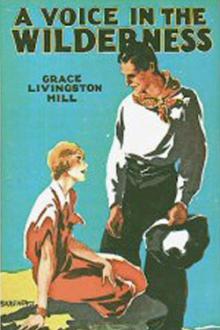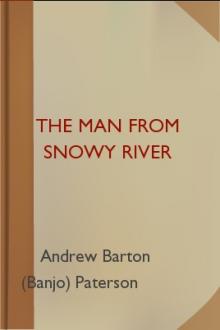The Gringos<br />A Story Of The Old California Days In 1849, B. M. Bower [cheapest way to read ebooks TXT] 📗

- Author: B. M. Bower
Book online «The Gringos<br />A Story Of The Old California Days In 1849, B. M. Bower [cheapest way to read ebooks TXT] 📗». Author B. M. Bower
"But you, Señor—do you not see that to fight for a prize merely is to belittle—" José waved a hand eloquently.
"I see you're taking life pretty serious," Dade retorted, moving farther along the log. "Sit down, José, and be sociable. Nothing like seeing the point of a joke, if there is one. Do you reckon anything's worth all the heart-burnings you're indulging in? Some things are tough; I've waded kinda deep, myself, so I know. But there's nothing you can't get over, with time and lots of common sense, except being a sneak—and being dead. To me, one's as bad as the other, with maybe first choice on death. You aren't a sneak, and I don't see why you hanker to be dead. What do you want to fight to the death for?"

José did not sit down beside Dade, but he came a little closer, "Why do I want to fight to the death? I will tell you, Señor; I am not ashamed. Since I was a child I have loved that señorita whom I will not name to you. Only last Christmas time the señora, her mother, said I must wait but a year longer till she was a little older. They would keep their child a little longer, and truly her heart is the heart of a child. But she knew; and I think she waited also and was happy. But look you, Señor! Then comes a stranger and steals—
"Ah, you ask me why must I fight to the death? Señor, you are a man; perchance you have loved—for of a truth I see sometimes the sadness in your eyes. You know that I must fight thus. You know that to kill that blue-eyed one is all there is left to do. Me, I could have put him out of the way before now, for there are many knives ready to do me the service. Kill him I shall, Señor; but it shall be in fight; and if the señorita sees—good. She shall know then that at least it is not a coward or a weakling who loves her. Do you ask why—"
Dade's hands went out, dismissing the question. "No, I don't ask another blamed thing. Go ahead and fight. Fight to kill, if that's the only thing that will satisfy you. You two aren't the first to lock horns over a woman. Jack seems just as keen for it as you are, so I don't reckon there's any stopping either one of you. But it does seem a pity!"
"Why does it seem a pity?" José's tone was insistent.
"It seems a pity," Dade explained doggedly, "to see two fine fellows like you and Jack trying to kill each other for a girl—that isn't worth the life of either one of you!"
In two steps José confronted him, his hand lifted to strike. Dade, looking up at him, flicked the ashes from his cigarette with his forefinger, but that was the only move he made. José's hand trembled and came down harmlessly by his side.
"I was mistaken," he said, smiling queerly. "You have never loved any woman, Señor; and I think the sadness I have seen in your eyes is for yourself, that life has cheated you so. If you had known love, you could never have said that. Love, Señor, is worth everything a man has to give—even his life. You would know that, if you had ever loved." He waited a moment, closed his teeth upon further words, turned abruptly on his heel and went away into the fog-darkened night.
Dade, with a slight curl to his lips that did not look quite like a smile, stared into the fire, where the embers were growing charred for half their length, and the flames were waving wearily and shrinking back to the coals, and the coals themselves were filmed with gray. The cigarette went cold and clammy in his fingers, and in his eyes was that sadness of which José had spoken; and something else besides.
They would fight, those two, and fight to kill. Since the world was first peopled, men had fought as they would fight—for love; for the possession of a pretty thing—warm, capricious, endearing, with possibly a heart and a soul beneath; possibly. And love—what was love, after all? What is love worth? He had loved her, too; at least, he had felt all the emotions that either of them had felt for her. He was not sure that he did not still feel them, or would if he let himself go. He did not believe, however, that those emotions were worth more than everything else in the world; more than his life, or honor, or friendship. He had choked love, strangled it, starved it for sake of friendship; and, sitting there staring abstractedly into the filming coals, he wondered if he had done wrong; if those two were right, and love was worth fighting for.
The man who fought the hardest, he felt, would in this case win that for which he fought. For he felt in his heart, that Teresita was only a pretty little animal, the primitive woman who would surrender to strength; and that he would win in the end who simply refused to yield before her coquetries.
With a quick, impatient gesture he threw his cigarette into the coals, kicked viciously a lazily smoking brand which sent up a little blaze and a spurt of sparks that died almost immediately to dull coals again.
"Love's like that," he muttered pessimistically, standing up and stretching his arms mechanically. "And the winner loses in the end; maybe not always, but he will in this case. Poor old Jack! After all, she ain't worth it. If she was—" His chin went down for a minute or two, while he stared again at the fire. "If she was, I'd—But she ain't. Love's worth—what is love worth, anyway?"
He did not answer the question with any degree of positiveness, and he went to bed wishing that he had never seen the valley of Santa Clara.
To give a clear picture of the preparations for that fiesta, one should be able to draw with strokes as swift as the horses that galloped up and down the valley at the behest of riders whose minds titillated with whatever phase of the fiesta appealed to them most; and paint with colors as vivid as were the dreams of the women, from the peonas in the huts to the señoritas and señoras murmuring behind the shelter of their vines.
One would need tell of those who went boldly into the mountains to find a grizzly bear and bring it alive and unhurt to the pen, which the peons, with feverish zeal and much chattering amongst themselves, were building close beside the smallest corral.
A great story it would make—the tale of that hunt! A man came back from it with a forearm torn sickeningly, to show how brave he had been. And the bear came also—a great, gaunt she-bear with two cubs whimpering beside her in the cage, and in her eyes a sullen hunger for the giant redwoods that stood so straight and strong together upon the steep slopes while they sang crooningly the songs she knew of old, and a glowing hatred for her captors.
A story that would make! A story in which Jerry Simpson and Tige played valiant part and bore more than their share of the danger, and became heroes to those who went with them.
One would need to picture somehow the bubbling excitement of Teresita, while she planned and replanned her festal garments, and tell how often she found it necessary to ride with Jack across the valley to talk the matter over with the "pretty Señora" Simpson, or to the Mission San José to see what Rosa had at last decided to wear.
Then, there would be the solemn conferences in the kitchen, between Margarita and the señora herself; conferences that had to do with cakes and preserves and the like, with the niños getting in every one's way, while they listened and smacked lips over the very naming of so many good things to eat.
One would need see the adobe corral that was to be transformed into an amphitheater where were hammering and clatter from sunrise till dark, without even a pause for midday siesta amongst those lazy peons who would sleep over their cigarettes, though the padres stood over them predicting the end of the world the next moment.
Well in the foreground of the picture would be Jack, to be sure; Jack riding far afield upon Surry, whom he had found the best horse for his purpose upon the whole ranch; lassoing cattle to get his hand in, practising certain little twists of his own invention, and teaching Surry to know without fail just what certain signals meant, and obey instantly and implicitly when they were given.
Sometimes, when the señorita was not in a perverse mood, she would ride with him and applaud his dexterity; at other times she would boast of José's marvelous skill, and pity Jack in advance for the defeat which she pretended was inevitable. Whether she pitied or praised, she seemed always sincere for the moment, so that Jack gave up any lingering hope of knowing how she really felt about it, and contented himself with the determination to deflect all the pity towards José when the time came, and keep the praise for himself.
There would be other contests; and scarce a day passed wherein no horse loped heavily up the slope and stopped with heaving flanks in the patio, while its rider dismounted and bowed low before Don Andres, giving news of some vaquero who wished his name to be listed as a contestant in the riding, or the lassoing and tying of steers, or in the bull-fight, perchance.
But there was no third name offered in the riata contest for which Solano was announced as a prize. All up and down the valley; at the ranches, on the trails when men met and stopped to talk awhile, and around the camp-fires of the rodeo they talked of it; and many bets would have been laid upon the outcome, had not all men been of one mind. When José was not present, or Dade, or the more outspoken of the Picardo vaqueros, always they spoke of it as the duelo riata, and took it for granted that it would be fought to the death. Thus are secrets kept from men who can read from their own natures the truth! The men of Santa Clara lowered lids and smiled whenever they spoke of it as a contest, for as a duel had the word first gone forth from the exultant lips of Manuel; as a duel would it still remain among themselves, spite of the fiesta and the prize that was offered, and the reiteration that it was but sport.
One should picture the whole valley for the background; a sunken paradise of greenery, splotched with color, made alive with bird-songs and racing cloud-shadows on the grass; with the wooded slopes of the Santa Cruz mountains closing in upon the west and sheltering it from the sweeping winds from off the ocean, and the grassy hills rising high and rugged on the east, giving rich pasturage to the cattle and all the wild things that fed there.
When it was complete—that picture—then might one weep to be there in the midst of it all! For there would be much laughter, and the love-making would make young pulses beat fast to think upon. There would be dancing, and the tinkle of guitars and mandolins, and a harp or two to beat a harmonious surf-song beneath the waves of melody. There would be feasting, with whole beeves roasted over pits which the peons were already digging in their dreams; with casks of wine from the don's own vineyard to wash down the juicy morsels. There would be all that throughout one long, moonlit night, with the day of sports to think back upon. And through the night they would talk of the duelo riata between two men who loved one little señorita who laughed much and cared little, said certain wise señoras, and nodded their heads while they said it.
What if some hearts were bitter over the prospect? From Santa Barbara, even, were they coming to the fiesta! (Gustavo had the news from a peon who came straight through from Paso Robles on an errand for his master.)
What if Dade, thinking and thinking until his brain was dizzy, lay long hours awake in his blankets and stared up at





Comments (0)